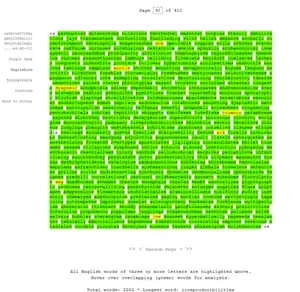 Screenshot of a page of a book at libraryofbabel.info, with English words highlighted | |
| Available in | English |
|---|---|
| Founded | 2015 |
| Founder(s) | Jonathan Basile[1] |
| URL | libraryofbabel |
The Library of Babel is a website created by Brooklyn author and coder Jonathan Basile, based on Jorge Luis Borges' short story "The Library of Babel" (1941).[1][2] The site was launched in 2015.[3]
Contents of the website
According to Basile, he "was lying in bed one night and the idea of an online Library of Babel popped into my head."[4] Basile quickly realized that an actual digitalized Babel Library would require more digital storage space than one can imagine.[5] To get around this limitation, he designed an algorithm to simulate the library instead.
The Library's main page contains background information, forums and three ways to navigate the library. These ways are to have the website randomly pick one of the thousands of "volumes", to manually browse through the library, or to search for specific text.[3] Due to the library's Infinite monkey theorem-gibberish-like contents,[6] there is an "Anglishize" feature, that points out words and clumps of words.[7]
The library's content is divided into numbered digital hexagons, each with 4 walls, 20 shelves and 640 volumes.[3] The names of hexagons are limited to 3360 alphanumeric characters, for a total of more than 105229 available hexes.
Algorithm
The algorithm Basile created generates a 'book' by iterating every permutation of 29 characters: the 26 English letters, space, comma, and period.[8] Each book is marked by a coordinate, corresponding to its place on the hexagonal library (hexagon name, wall number, shelf number, and book name) so that every book can be found at the same place every time. The website can generate all possible pages of 3200 characters and allows users to choose among about 104677 potential pages of books.[9][6]
Academic response
The Library of Babel website attracted the attention of scholars, particularly those working at the juncture of humanities and digital media.[10][11][12] Zac Zimmer wrote in Do Borges's librarians have bodies: "Basile's is perhaps the most absolutely dehumanizing of all Library visualizations, in that beyond being driven to suicidal madness or philosophical resignation, his Librarians have become as devoid of meaning as the gibberish-filled books themselves."[11] Journalist Jerry Adler said "It just may be the most fascinatingly useless invention in history."[5]
Creator
Jonathan Basile is a Brooklyn[13] author and programmer. Basile has authored two books, one of which has been published by Punctum Books.[14] When asked how he got the idea for the website, Basile responded, "My first thought was — it must exist already. It seems like such a natural extension of the capabilities of a computer that I was sure someone would have made it. The next day I looked for it, a bit excitedly, and was disappointed. From then on, it’s kind of been a reluctant destiny for me."[4]
References
- 1 2 Creighton, Jolene (29 April 2015). "Meet the Library of Babel: Every Possible Combination of Letters That has Been (or could be) Written". Futurism. Retrieved 22 November 2020.
- ↑ Ulin, David (29 April 2015). "Borges' 'Library of Babel' comes to virtual life". Los Angeles Times. Retrieved 22 November 2020.
- 1 2 3 Katy Waldman (29 April 2015). "Jorge Luis Borges' "Library of Babel" Is Now a Real Website. Borges Would Be Alarmed". Slate. Retrieved 22 November 2020.
- 1 2 Sturgeon, Jonathon (29 April 2015). "Brooklyn Author Recreates Borges' Library of Babel as Infinite Website". Flavorwire. Retrieved 22 November 2020.
- 1 2 Jerry Adler (October 2015). "This Digital Library Contains Every Phrase That Could Ever Be Uttered". Smithsonian. Retrieved 22 November 2020.
- 1 2 Naro, Maki (7 July 2016). "Explore an Infinite Library from Home". Popular Science. Retrieved 22 November 2020.
- ↑ "Borges's Universal Library Is Now A Website, But Good Luck Finding Anything". Fast Company. Retrieved 22 November 2020.
- ↑ Lee, Joyce (7 July 2015). "Jorge Luis Borges's infinite 'Library of Babel' has been digitized". Quartz. Retrieved 22 November 2020.
- ↑ Alison Flood (4 May 2015). "Virtual Library of Babel makes Borges's infinite store of books a reality – almost". The Guardian. Retrieved 22 November 2020.
- ↑ Portela, Manuela (2017). "Writing under Constraint of the Regime of Computation". In Joseph Tabbi (ed.). The Bloomsbury Handbook of Electronic Literature. Bloomsbury Publishers. pp. 181–200. ISBN 9781474230278.
- 1 2 Zimmer, Zac (11 December 2018). "Do Borges's librarians have bodies". In Andrew R. Reynolds; Heather J. Allen (eds.). Latin American Textualities. History, Materiality, and Digital Media. University of Arizona Press. pp. 197–220. ISBN 9780816539024.
- ↑ Sarah Warren (2020). "Review: Do Borgesians Dream of Transcendent Totality?". Discourse. 42 (1–2): 250–253. doi:10.13110/discourse.42.1-2.0250. JSTOR 10.13110/discourse.42.1-2.0250. S2CID 226523411.
- ↑ Sturgeon, Jonathon (23 April 2015). "Brooklyn Author Recreates Borges' Library of Babel as Infinite Website". Flavorwire. Retrieved 2 December 2020.
- ↑ "Jonathan Basile". Retrieved 2 December 2020.